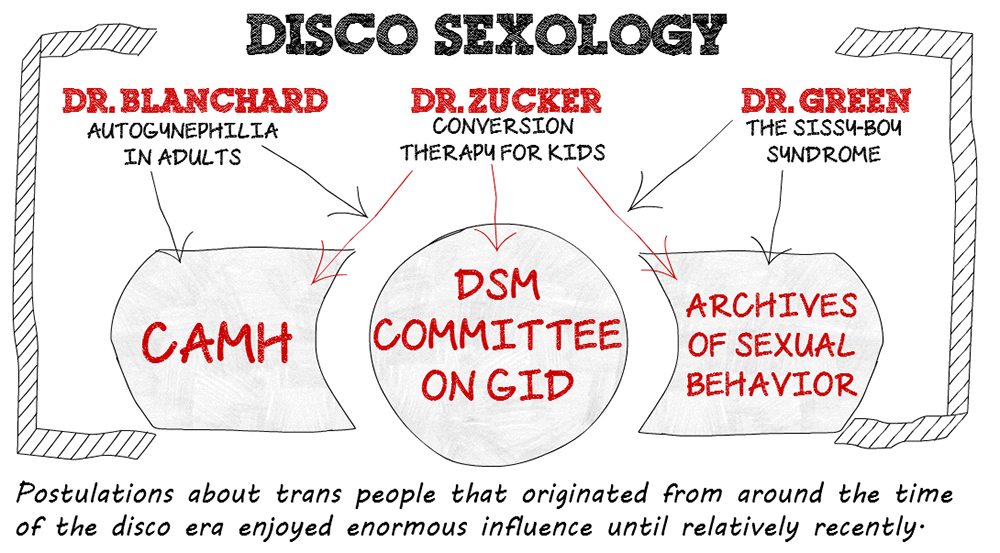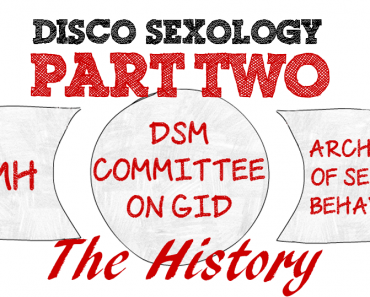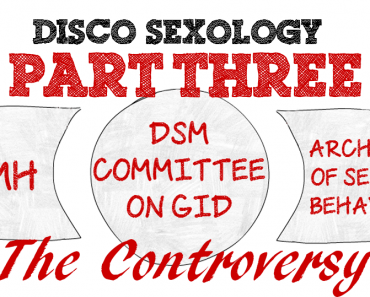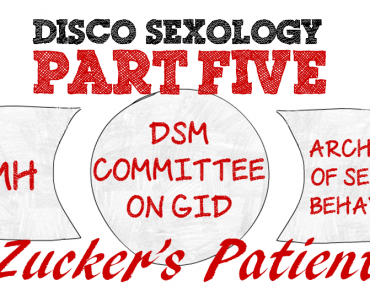By Cristan Williams
Foreword
With the recent enthusiastic promotion of disco-era ideas about trans people and gender identity in general, the TransAdvocate felt that it would be important to release a comprehensive review of these ideas. In this series that will feature the tag #DiscoSexology, the TransAdvocate will review the fomentation of these gender postulations into an axiomatic body of circular logic, how this circular logic was and continues to be vigorously promoted and defended, regardless of the cost to it research subjects: children and even infants. Moreover, this series will trace the rise and fall of the Centre for Addiction and Mental Health (CAMH) gender program as envisioned by Disco Sexologists, featuring full-length interviews with the clinical director of CAMH and a long-term survivor of Dr. Zucker’s specialized treatment. Other interviews include:
- An interview with a Radical Feminist pioneer in affirmative care for trans people.
- An interview with the co-author of the SAMHSA’s repudiation of reparative therapy and co-founder of Gender Infinity.
- An interview with the author of the groundbreaking book, The Last Time I Wore A Dress: A Memoir.
- An interview with a sexologist who dared question the gender postulations of Dr. Money and paid the price.
Along the way, this article will provide first-hand accounts of a presentation in which Drs. Zucker and Green presented back-to-back arguments against laws banning conversion therapy, as well as a comprehensive review of the uncritical media exposure disco-era gender ontology currently enjoys.
Upon completion of this series, this work will be released, in its entirety, as both an audio and ebook.


Five Pieces of Jargon
Throughout this article, I use certain jargon to conceptualize #DiscoSexology in a way that reveals rather than obscures some truths about its nature. Therefore, I’ve included this short review of the five concepts I use in this series:
- Opinion Leader: A group or individual that has the power to shape wider opinions.
- Ontology: Should one say, “think outside the box!” ontology is the box. In this article, “ontology” refers to institutionalized postulations concerning what it means to be trans.
- Power-Knowledge: Power created by and conferred through a knowledge-base/ontology.
- Governmentality: State-level power to modulate conduct using power-knowledge.
- Iatrogenic: Harm inadvertently caused by medical or psychological treatment.
Note: A review of terms used within trans discourse is located here.

Introduction
I experienced this as a strong negative judgment about something I felt very deeply about myself, at my core. As a result, I think that the main thing that I took away from my years at Green’s gender clinic at UCLA was a kind of self-hatred and a loss of a sense of who I really was. I learned to hide myself, to make myself invisible, even to myself. I learned that who I was, was wrong.
– Bryant, one of Dr. Green’s “sissies” from his Sissy Boy Syndrome study
Depending on who you believe, when Toronto’s Centre for Addiction and Mental Health (CAMH) parted ways with the controversial sexologist Dr. Kenneth J. Zucker and committed itself to a process of restructuring, CAMH either took a significant step towards providing ethical community-based trans care or, as Zucker’s advocates would have us believe, fell into the hands of politically correct trans activists who intend to use the bodies of vulnerable children to further their “transgender ideology” and/or “transgender agenda.” This article reviews and contextualizes the fact claims made by both sides of this story and contrasts these claims against the experience of a long-term recipient of Zucker’s therapy and the realities behind CAMH’s restructuring, as described by its medical director.
In the process of doing research for this article, I noticed there seems to be a particular set of ideas, propagated around the time of the disco era, that stands in stark contrast to contemporary ethical therapeutic models for working with transgender individuals. I came to think of these particular views as “Disco Sexology.” At its heart, this is a story about a cathartic moment in the way mental health professionals regard trans people and the trans experience itself. Sexological ideas about trans people from around the time of the disco era have held sway over the care and treatment of trans kids and adults until very recently. Sexologists who postulated that sexual fetishes and/or gender roles drove trans people to implicitly experience their bodies in the way they do in no small way comprised the ontological foundation of trans care for decades.
For instance, Drs. Ray Blanchard (creator of “autogynephilia”) and Zucker (who believed he could cure trans kids) were opinion leaders at CAMH and in the DSM committee on so-called “gender identity disorders” while Drs. Zucker and Richard Green (creator of the Sissy Boy Syndrome) were opinion leaders at the Archives of Sexual Behavior and in the DSM GID committee. I believe that over time Dr. Zucker came to represent the power of a particular type of sexology personified at CAMH because he held leadership roles at CAMH, the DSM GID Committee, and the Archives of Sexual Behavior all at the same time.
The power-knowledge1 Disco Sexology held over the lives of trans people is waning and newer therapeutic patient-centered models, informed by decades of clinically observing the value of Disco Sexology gender postulations, are proving themselves to be more efficacious. However, Disco Sexology advocates claim they are being oppressed and that their postulations are being discarded because of politics, not clinical observations. Disco Sexology advocates publicly fret that while trans youth and young adults show consistently good outcomes when they encounter treatment informed by contemporary best practices, these youth, and young adults may nevertheless, later in life, come to regret that they had not undergone Disco Sexology-informed therapy. While there’s no contemporary clinical evidence to suggest the concerns of Disco Sexology advocates are evidence-based2, Disco Sexology advocates find their postulations welcome on numerous mainstream media platforms. Proponents of Disco Sexology have cultivated supporters within the media, have sued and threatened to sue Disco Sexology dissenters3 4, and continues to attempt to influence the way therapists interact with trans people of all ages throughout the world. Perhaps most troubling is that Disco Sexology informs the way hate groups target trans people. ⬛

- “Eventually, Foucault came to… [focus on] “power-knowledge” (pouvoir-savoir), by which he meant to indicate the myriad ways in which, in any age, structures of social power and governing epistemes reinforce and legitimate each other.” – Wolin, Richard. “Continental Philosophy – French Nietzscheanism.” Encyclopedia Britannica Online. Accessed July 04, 2016. https://www.britannica.com/topic/continental-philosophy/French-Nietzscheanism#ref978074.
- This series will entirely debunk the claims of Disco Sexology advocates who assert that the vast majority of gender dysphoric children stop having gender dysphoria as they grow up.
- See: http://ai.eecs.umich.edu/people/conway/TS/News/US/Zucker/Kenneth_Zucker’s_pattern_of_silencing_transgender_critics.html
- See also: http://theglobeandmail.com/news/toronto/gender-identity-debate-swirls-over-camh-psychologist-transgender-program/article28758828



One thought on “#DiscoSexology Part I: Dr. Zucker, CAMH, & Conversion Therapy”